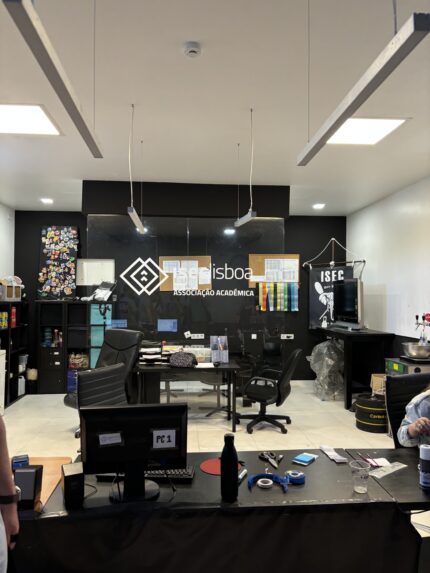I’m full of pastel de nata and slightly sun burnt on my return from the Wonkhe SUs study tour to Portugal but that’s not all. I also have lots of takeaways from chatting with lots of SU officers and reps across the country that are worth reflecting on.
Jim has covered our trip on the site in some detail already so instead of treading the same water again, here’s some of what I found interesting, what we learnt and how SUs might be able to adopt some of the practice. There’s some nice pictures too.
1. Wants and needs
After walking up a “rocky-style” amount of steps at the University of Coimbra, we were greeted with a very cool installation in the middle of a quasi public square.
Two big boards were on either side of the square, with a mirror in the middle and two pictures of the Carnation Revolution and student activism. Around these boards were lots of placards with statements on. A few were on the floor – I thought this was an artistic choice but later found some drunk students the night before had knocked them over, maybe that’s even more arty?
The main one pictured below says “insufficient number of students in the governing bodies of HEIs,” others reflected on high international tuition fees and high drop out rates of students.
SUs in the UK can’t replicate the culture that predates this, but this way of campaigning is very much about wants and needs. By placing placards, without colour and big graphics, in the middle of the square, with simple slogans like “tuition fees are too high” sets out what students care about against the university but also for the general public (who walk through this area) to understand their needs.
SUs do things like statements on their websites frequently but what about loud and proud placards that articulate students’ needs to the university and public. It’s a trend we’ve seen in multiple countries across Europe, that student organisations are much clearer at letting their student population (and sometimes the wider public) know what they think about things. Whether this is through posters, protests or policy books, what the SU stands for is loud and clear.
It’s worth noting this exhibition is there because of the bank holiday that marks the revolution. But instead of just remembering previous student activism, it’s a site to build on it, ask for more and make further strides for students’ rights. Very cool.
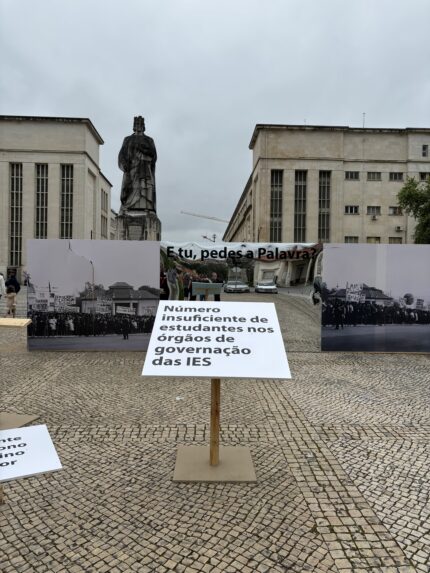
2. Culture and tradition
One thing that captivated our study tour was the amount of culture and tradition that dominated student life both inside and outside of the SU. Some examples of this was a practice of carrying around a big spoon on campus (almost like a BNOC), wearing a big cloak with patches sewn on representing your culture and identity and collecting ribbons with messages from friends and family whilst also burning one that you wanted to “let go.”
Now, SUs can’t copy and a paste a tradition of cloaks and sewn-on patches onto UK campuses – it won’t work. But there was something unifying about culture and tradition at each university we visited that evoked belonging.
With things like the patches or the spoon, there’s something special in this “overt belonging,” that sees students’ presenting their belonging through something physical and showing it off to everyone.
At the end of each of our visits to different institutions we do a “vote of thanks” which often involves a little gift from a different SU and you get a sense of the embers of a tradition or a mascot that could evolve into something more – a bit like the Long Boi duck.
Tradition doesn’t start overnight but there’s lots of fun little things that the SU could host, letters to future selves, something special on graduation, an iconic mascot that appears at Varsity that students can unify around over the years. And the best thing about these traditions we saw were that they change and adapt from generation to generation, the main priority is that students own them.
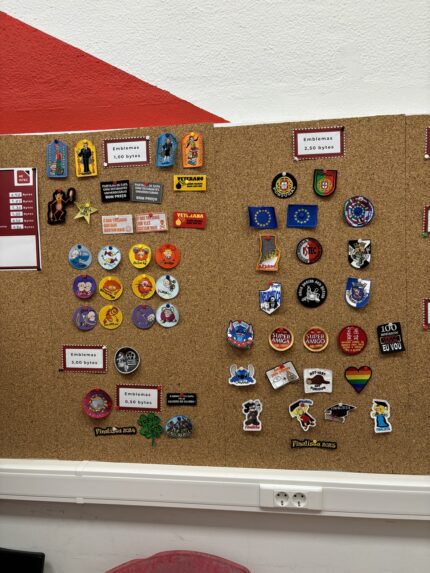
3. Talking rights
At ISCTE, an institute at the University of Lisbon, I kept seeing (very well-designed) posters with more placards on. The picture below marks a “student day” and is rallying students around “article 74” which you have to assume is something related to housing legislation. It says “social action” and “there is no right to education without the right to student housing. Accommodation now!”
A lot of lobbying and work on national legislation in the UK can sometimes be behind the scenes. Sometimes this is the most successful way to get students’ voices heard in Parliament on national policy, it’s something SUs are very good at by responding to various consultations, calls for evidence and writing and speaking to elected officials.
Perhaps in Portugal, this method of activism (protest) is the most effective. But it’s not the method I’m most interested in, it’s how they articulate their asks.
These posters are talking about rights, that student housing is intrinsic to the right to education and that policy makers can’t separate one from the other. The specifics in the poster – article 74 – rallies students around a specific problem with the bill, not just housing more broadly. Imagine a world where students were equally annoyed in England about Clause 4A which could evict them over summer in the new Renters’ Rights Bill.
And even if this isn’t successful, as a result of the campaign, students are not only aware of what rights they have, but also the rights that they should have.
One student leader said to us “we are working for the future because we are not seeing the changes today.” There’s an understanding within these organisations that some of their lobbying won’t make a change tomorrow but it will do next year or the year after.
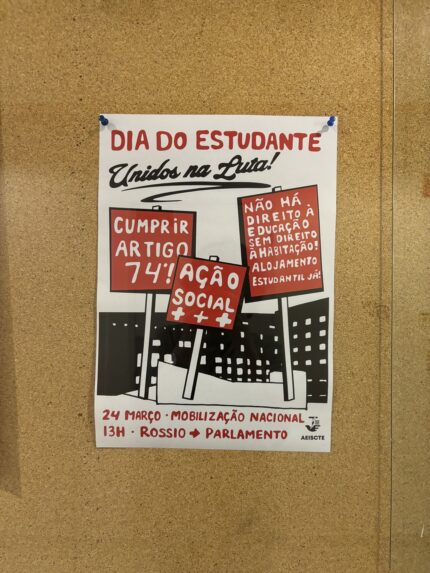
4. Trust
At ISTEC, another institution at the University of Lisbon we got a very cool tour around their computing space, including a green screen suite and a room decked out for audio recording. We asked the traditional question of “who can use this, only computing students?” and were greeted with “any student can use it.”
The lecturer who took us round gushed about how the culture was to simply trust students to use the equipment, without lengthy processes of “checking things out” or restricting use – they could just use it for their studies or personally.
And whilst not exactly linked, my camera roll is also full of pictures of microwaves. Now, a lot of them looked like they may not pass a UK health and safety check but there was an abundance of them.
One sign just said “clean them after please.” Student officers have often had to fight to get students access to a microwave so students can save costs and heat up food. Embedding a culture of trust isn’t easy but rather than infantilising students, giving them ownership over spaces, processes, events so that they work for them and their students rather than what works for institutions is one way to enhance this.
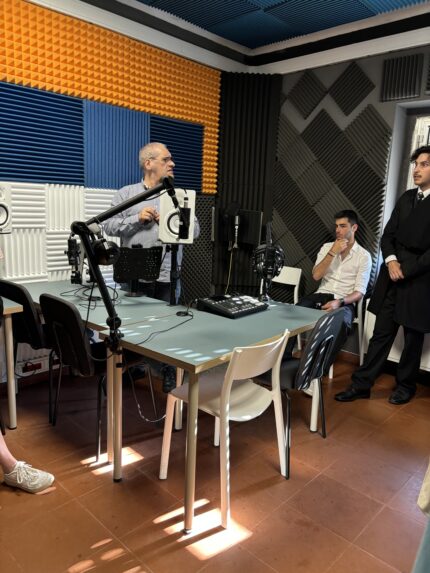
5. I could do that
The last thing which is always notable on all of our study tours is the ease of participation and involvement. Part of this is students aren’t experiencing the same cost of living pressures and likely are not as time poor as UK students but it also feels heavily linked to the ease of getting involved.
The student owned spaces we visited were incredibly student-y, the roles were easy to apply for, and the majority of reps and officers we spoke to got involved because they knew someone else who had done it and were recommended to.
The cause or the reason they were motivated to get involved was almost primarily about helping students. One leader said “it’s bigger than us.”
Where they felt like they didn’t have loads to do at university socially, they used their student associations to create “something to do” which then led to all the belonging.
The more that SU activities, events, processes, (all methods of participation) are made more accessible and easy to join, the more students will come. And when it comes to things like elections or reps, processes like “recommending a friend” may be the most effective way to build confidence and get more students involved.
